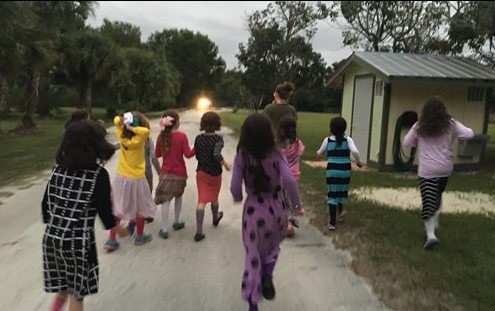
by Rebecca Halff
I’m Denominationally Conflicted. Are You?

I’ve been “denominationally conflicted” for a while now—and I suspect I’m not the only one whose intellect doesn’t match her emotions when it comes to Judaism. While I believe fiercely in egalitarianism (although I did not have a bat mitzvah, I loved reading from the Torah for three of my siblings’ bar and bat mitzvahs), my heart doesn’t soar in the Conservative shul to which my family belongs to the way it does in ultra-Orthodox settings.
My attempts at understanding the disconnect between what I believe and what I feel have yielded only vague hypotheses. Sometimes I think it’s the women-only spaces created by gender-segregated services which appeal to me. Maybe it’s something evoked by the accents, the intonation, the melodies, the mannerisms, the motions. It could also be the cozy, communal feeling of being outsiders together which comes with a recognizable dress code and a set of habits and traditions often viewed by gentiles and secular Jews as mysterious and unsettling.
As a kid, I spent my summers at a girls-only Lubavitch sleepaway camp in the Pyrenees Mountains in France. Whereas at home I adhered to no dress code whatsoever, in camp we all wore opaque wool tights, ankle-length skirts, long-sleeved shirts that covered our collarbones, and close-toed shoes. Buttons and zippers were frowned upon. “When a door is open, you want to peek inside,” instructed one of our counselors, “So too buttons make men want to peek inside.” I was nine years old, but I recognized immediately that this was a creepy thing to say, and filed it under the category of “things to report to my parents when I get home.” (However ridiculous I considered the counselor’s ideas, however, it does not escape me that I’ve remembered her exact words for all these years—clearly they made an impact.)
Covered from head to toe in the stifling summer heat, we would trek up a different mountain every day, all of us bright red and sweating. Zero safety precautions were taken. One day, we happened upon a herd of cows peacefully grazing in a field. “Cows are friendly,” said our seventeen-year-old counselor with confidence. “Come on,” she urged another counselor, “they’re nice, let’s pet them.” Off they went in the direction of the cows—and the next thing we knew we were being charged by the entire herd. How terrifying and thrilling it was to run like maniacs down the mountain, laughing hysterically and shrieking, escaping a gang of wild cows.
When we reached the top of our mountain on any given day, we would throw down our plastic bags of Bissli and Bamba snacks with abandon and collapse onto the grass. Then, after a few minutes of rest, our tradition was to gaze out at the tremendous view and recite Tehilim. To this day, the experience of sitting in a cluster of girls on the top of a mountain, playing with the grass and weeds with a free hand while flipping pages in my psalm book with the other, praising God for creating such a beautiful Earth, remains the most moving spiritual moment I can remember.
I hope to feel the strength and freedom I felt during those summers again. There was no self-consciousness and no pressure placed on us to be boring. Nobody looked uncomfortable in her body. We were absolutely wild. We ran, we jumped, we explored. We broke every rule we could. We shouted and joked and cackled maniacally. Perhaps we were so uninhibited and rough because there were no boys around to assume those roles in our place, to steal “wildness” and “mischief” and “badness” from the girls. We did not have to be the quiet, immobile foil to a rowdier group.
There were also no men in charge. To preserve standards of modesty and propriety, all of our counselors, as well as the higher-ups in the girls’ camp, were women. Only one man, a tiny, gentle, practically invisible old Rabbi, appeared sometimes around dinnertime. Knowing I was vegetarian and there wasn’t much I could eat from the standard camp fare, he would very discreetly approach while I was busy chatting with friends and quietly deposit fruits and vegetables onto my plate. I would turn around to a pile of cucumbers and tomatoes, and spot him scurrying off in the distance, a model of sweetness and (true) modesty.
Now in my 20s and living in Brooklyn, it has been a struggle to find a congregation that simultaneously upholds my values and feels conducive to my spiritual growth. I oppose the oppression and repression of women that is so ubiquitous in the Haredi world, but I also cannot stand sitting next to men when I daven. I believe Judaism is about social justice, but I can’t get into the happy, arms-around-each-other, “Free to Be You and Me”-style singing that is so popular at shuls that espouse this philosophy. I can only achieve true kavanah—that inner feeling of full immersion in and commitment to one’s prayers—in semi-silence and semi-solitude, amidst shuckling and Yiddish-inflected moaning from the men’s section. I’m clearly denominationally conflicted. Are you?